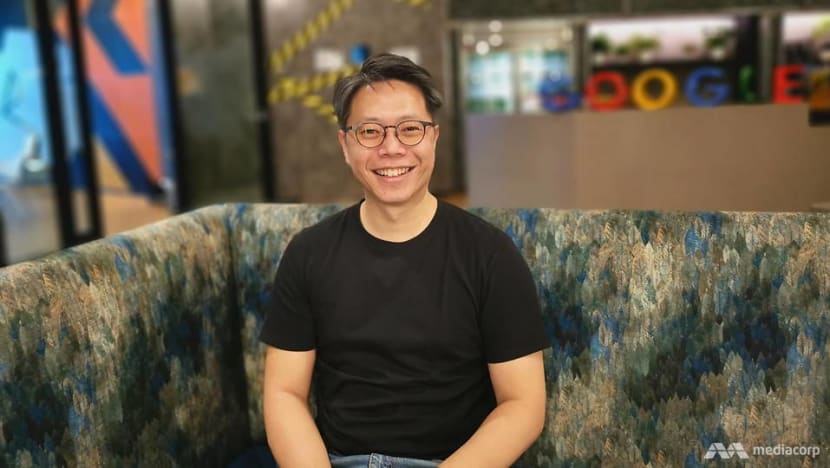Meet the Singaporean behind Google Assistant's personality and jokes
Mr Woo Wai Keong has a simple litmus test to know if his efforts at making people fall in love with Google’s digital assistant is working: “My mum must get it.”

From jokes and trivia to relevant information, Mr Woo Wai Keong is part of the team responsible for making Google's digital assistant relatable to its users - wherever they may be based in.
SINGAPORE: For Google's Woo Wai Keong, creating an emotional connection between people and their robot assistant is not just a concept or the premise for an episode of the mind-bending science fiction TV series Black Mirror.
It is something he grapples with daily as the Asia-Pacific lead for Google Assistant Personality.
Having no template or manual to refer to in trying to achieve this "nebulous" and "ambiguous" task makes it a little challenging too, he told CNA on the sidelines of a recent media briefing.
But he shared that when the digital assistant was launched in 2016, there were three overarching principles that developers have to adhere to: It is smart, and getting smarter; It speaks human, but doesn’t pretend to be one; and it is helpful, but never in the way.
READ: How did Google’s digital assistant pick up Singlish?
The tricky bit is how to apply these abstract principles into actual, real-world applications.
Take the example of a user asking Google Assistant about Neapolitan ice cream, he suggested.
A response such as “I like Neapolitan ice cream" will not work when the second principle is applied as it would suggest that the digital assistant had tried the ice cream - which is obviously impossible, he reasoned. The alternative is a workaround sentence conveying a suggestion: “You can’t go wrong with a Neapolitan.”
PUTTING USERS FIRST, AND IT’S NO JOKE
Before Google, the 41-year-old Singaporean led Apple's iTunes video business for Southeast Asia. He also has a decade of experience under his belt working in the cable and television business for companies like Sony Pictures and Discovery Network.
Asked how his past work experiences helped him in his role at Google, Mr Woo said: “At the risk of sounding cliched, it’s about empathy for the user and putting people first.”
For instance, TV programming required him to understand his audience, the content they like and when they are most likely to watch these shows, he shared.
He and the “quite small” team overseeing Google Assistant would bring this same user-first approach in crafting content for the platform.
This would mean hitting the streets to canvass Australians for their best memories on Australian football - something the Google executive shared they did last year. The aim was to find out what about the subject struck an emotional chord for people, he said.
They also use jokes as a tool to bridge the gap between humans and machines, Mr Woo revealed.
“We spend a lot of time thinking about jokes, refining them and how they can be told on different platforms like speakers and phones,” he said. “We could think one day: ‘What if Google Assistant is obsessed with elephants today? What jokes would it tell?’”
So for its Simplified Chinese feature, which was being progressively rolled out from Tuesday, the team incorporated a Xiao Ming joke into the repertoire of responses as it would likely resonate with many, he explained.
The use of Xiao Ming locally as the go-to name in Chinese compositions and exams has been ubiquitous to the point that everyone can appreciate the reference, Mr Woo explained.
How much time then did the team spend thinking about Xiao Ming jokes?
“I honestly don’t know how much time we spent on this,” Mr Woo said, adding that Google Assistant probably has “dozen-ish” iterations of the joke but “not enough”. More will be introduced, he promised.
The other big challenge is working across the different languages in this part of the world and scaling its content creation efforts, particularly as jokes don’t travel well.
“You can’t just put a Xiao Ming joke into Google Translate and expect it to work somewhere else,” he explained.
GOOGLE ASSISTANT = FRIEND?
At the end of the day, it is about establishing an emotional connection between users and Google’s virtual assistant, something the executive admitted might be a scary prospect for some.
READ: A world ruled by robots? This artificial intelligence expert paints a different reality
Mr Woo shared that his mother, who is in her 80s, is among the the generation that would find technology intimidating to use. “She used to call me up and ask me: ‘How to do this ah?’”
So, he abides by a simple litmus test: “My mum must get it.”
Things have improved with the Googler sharing that his mum is now able to do a search using voice commands.
“I won’t teach her how to use Google Assistant to call me though!” he added, laughingly.
His personal goal: To one day be able to talk to the machine like a friend.
“I should be able to relate to (Google Assistant) on a personal level,” he said, but added that he is unsure if this is even technologically feasible.














